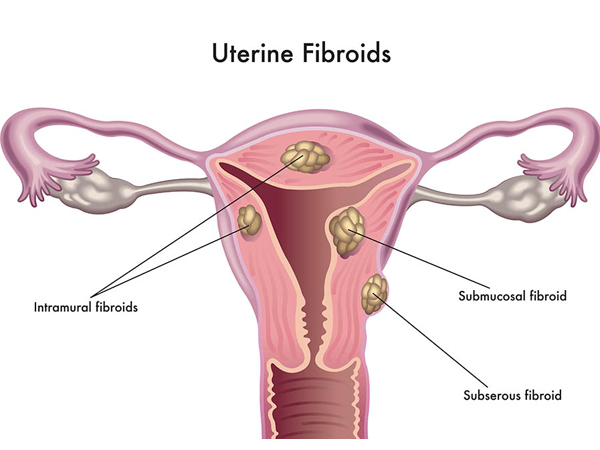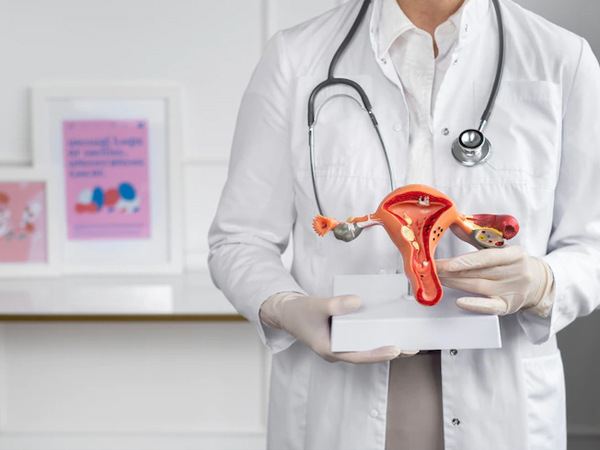Dr. Sudeshna Saha
PCOS Specialist in Kolkata, West Bengal, India
For Appointment Call + 91 98302 45993
Call Between Monday to Saturday 8 A.M. TO 6 P.M.
WhatsApp
+91 98302 45993


For Appointment Call + 91 98302 45993
Call Between Monday to Saturday 8 A.M. TO 6 P.M.
WhatsApp
+91 98302 45993



Uterine fibroids are noncancerous growths of the uterus that often appear during childbearing years. Also called leiomyomas (lie-o-my-O-muhs) or myomas, uterine fibroids aren't associated with an increased risk of uterine cancer and almost never develop into cancer.
Fibroids range in size from seedlings, undetectable by the human eye, to bulky masses that can distort and enlarge the uterus. You can have a single fibroid or multiple ones. In extreme cases, multiple fibroids can expand the uterus so much that it reaches the rib cage.
Many women have uterine fibroids sometime during their lives. But most women don't know they have uterine fibroids because they often cause no symptoms. Your doctor may discover fibroids incidentally during a pelvic exam or prenatal ultrasound.
Facts
1) Uterine fibroids are benign tumors that originate in the uterus (womb).
2) It is not known exactly why women develop uterine fibroids.
3) Most women with uterine fibroids have no symptoms. However, fibroids can cause a number of symptoms depending on their size, location within the uterus, and how close they are to adjacent pelvic organs. These are most commonly abnormal bleeding, pain and pressure.
4) Uterine fibroids are diagnosed by pelvic exam and by ultrasound.
5) If treatment for uterine fibroids is required, both surgical and medical treatment options are available.

Symptoms
Many women who have fibroids don't have any symptoms. In those that do, symptoms can be influenced by the location, size and number of fibroids. In women who have symptoms, the most common symptoms of uterine fibroids include:
i) Heavy menstrual bleeding
ii) Menstrual periods lasting more than a week
iii) Pelvic pressure or pain
iv) Frequent Urination
v) Difficulty emptying the bladder
vi) Constipation
vii) Backache or leg pains
Rarely, a fibroid can cause acute pain when it outgrows its blood supply, and begins to die.
Fibroids are generally classified by their location. Intramural fibroids grow within the muscular uterine wall. Submucosal fibroids bulge into the uterine cavity. Subserosal fibroids project to the outside of the uterus.
When to see a doctor
See your doctor if you have:
i) Pelvic pain that doesn't go away
ii) Overly heavy, prolonged or painful periods
iii) Spotting or bleeding between periods
iv) Difficulty emptying your bladder
Seek prompt medical care if you have severe vaginal bleeding or sharp pelvic pain that comes on suddenly.

Causes
Doctors don't know the cause of uterine fibroids, but research and clinical experience point to these factors:
Genetic Changes - Many fibroids contain changes in genes that differ from those in normal uterine muscle cells.
Hormones Estrogen and progesterone, two hormones that stimulate development of the uterine lining during each menstrual cycle in preparation for pregnancy, appear to promote the growth of fibroids. Fibroids contain more estrogen and progesterone receptors than normal uterine muscle cells do. Fibroids tend to shrink after menopause due to a decrease in hormone production.
Other Growth Factors
Substances that help the body maintain tissues, such as insulin-like growth factor, may affect fibroid growth.
Risk factors
There are few known risk factors for uterine fibroids, other than being a woman of reproductive age. Other factors that can have an impact on fibroid development include:
Heredity - If your mother or sister had fibroids, you're at increased risk of developing them.
Race - Black women are more likely to have fibroids than women of other racial groups. In addition, black women have fibroids at younger ages, and they're also likely to have more or larger fibroids.
Environmental Factors - Onset of menstruation at an early age; use of birth control; obesity; a vitamin D deficiency; having a diet higher in red meat and lower in green vegetables, fruit and dairy; and drinking alcohol, including beer, appear to increase your risk of developing fibroids.

Complications
Although uterine fibroids usually aren't dangerous, they can cause discomfort and may lead to complications such as anemia from heavy blood loss.
Pregnancy and Fibroids
Fibroids usually don't interfere with getting pregnant. However, it's possible that fibroids - especially submucosal fibroids - could cause infertility or pregnancy loss. Fibroids may also raise the risk of certain pregnancy complications, such as placental abruption, fetal growth restriction and preterm delivery.